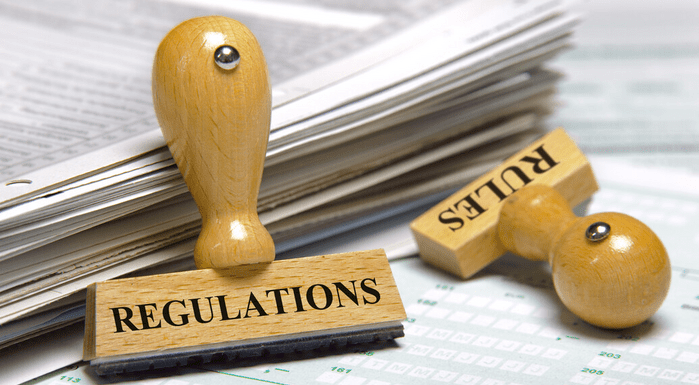Europe is poised for a tougher anti-money laundering (AML) regime, following a landmark deal between lawmakers.
The agreement between the EU Council and European Parliament covers key parts of a sweeping package of measures designed to protect the EU from the risks of money laundering and terrorist financing.
Under the deal announced on 18 January, all rules that apply to the business world will be enshrined in a so-called ‘single-rulebook’ regulation.
Meanwhile, the sixth Anti-Money Laundering Directive will instruct Member States on the AML and Combating the Financing of Terrorism (CFT) systems they must set up and maintain in their national laws.
By the book
One of the single rulebook’s most crucial steps is to expand the list of ‘obliged entities’ that must abide by the region’s AML and CFT measures.
While that term has typically covered banks, real estate agencies, asset management firms and casinos, it now applies to most of the crypto sector. Crypto-asset service providers (CASPs) must verify facts and data on their customers and report any suspicious activity. They must also conduct due diligence on any transaction of €1000 or above.
Other new obliged entities include traders of luxury goods – such as precious metals and stones, artworks, high-end cars, planes and yachts – as well as professional football clubs and agents. However, as risk in the football sector varies, national governments will be able to remove clubs and agents from the list in Member States where risks are low.
Enhanced due diligence will be required around cross-border relations between CASPs, plus business links between credit or finance providers and high net worth individuals. It will also apply to relationships involving high-risk countries with AML and CFT shortfalls that could threaten the EU’s internal market. To make it harder for criminals to launder dirty money, the rulebook sets an EU-wide, maximum limit for cash payments of €10,000.
In addition, the rulebook clarifies the EU’s approach to beneficial ownership. It splits the term into two parts – ownership and control – stressing that both must be analysed, and sets an ownership threshold of 25%. It also sharpens rules around multi-layered ownership and control structures to ensure that – in the Council’s words – “hiding behind multiple layers of ownership of companies won’t work anymore”.
Risk controls
Beneficial ownership is also a major theme of the sixth AML Directive. Ownership data will be shared online in a set of national registers and in a series of networked hubs at EU level. Those registers will need to flag up any parties or business arrangements that are linked to people or entities subject to targeted financial sanctions.
Officials in charge of the registers will have the power to inspect the premises of any listed party, should doubt emerge over the accuracy of its data.
Each Member State must ensure that all obliged entities within its borders are subject to effective scrutiny by one or more national watchdogs. Those bodies will apply a risk-based approach.
The Council says that EU and national risk assessments remain important tools. As such, the European Commission will carry out an EU-wide study of risks around money laundering and terrorist financing. It will then provide Member States with thoughts on how to reduce those risks. At the same time, Member States will conduct their own national assessments and pledge to clamp down on any risks found.
But perhaps the most notable part of the Directive is the power granted to Member States’ Financial Intelligence Units (FIUs). Under the deal, those bodies will have direct access to EU data on a host of topics linked to AML and CFT risks. That will cover areas such as tax, assets frozen under sanctions, standard and crypto fund transfers, and customs – plus national registers of motor vehicles, aircraft, watercraft and weaponry.
FIUs will also have the power to suspend, or withhold consent to, transactions so they can investigate suspicious activity.
The agreement follows a 13 December deal between the Council and Parliament to create an EU Anti-Money Laundering Authority (AMLA). As the main feature of the EU’s AML/CFT drive, AMLA will oversee high-risk obliged entities in finance. It will also support work related to other sectors. Talks on its location are ongoing.
No refuge
Belgian Minister of Finance Vincent Van Peteghem says: “This agreement is part and parcel of the EU’s new anti-money laundering system. It will improve the way national systems against money laundering and terrorist financing are organised and work together. This will ensure that fraudsters, organised crime and terrorists will have no space left for legitimising their proceeds through the financial system.”
ICAEW Economic Crime Manager Mike Miller says: “It is encouraging to see EU lawmakers backing stricter controls on money laundering and terrorist financing. Western jurisdictions have been forced to adapt quickly to global trends and limit gaps in their regimes that bad actors have repeatedly exploited to move and hide dirty money.”
Miller says the UK is also mulling actions to simplify AML/CTF supervision. “Just last year, a consultation probed the effectiveness of our current AML rules. Taken in partnership with our US and EU allies, these actions are key to reducing the appeal to criminals of western financial systems – and their ability to exploit them.”
The deal is now pending formal adoption by the Council and Parliament before it comes into force.
Economic crime hub
In these articles and videos, we explore the latest trends and perspectives on economic crime from around the world, and look at how chartered accountants can help prevent it happening.




